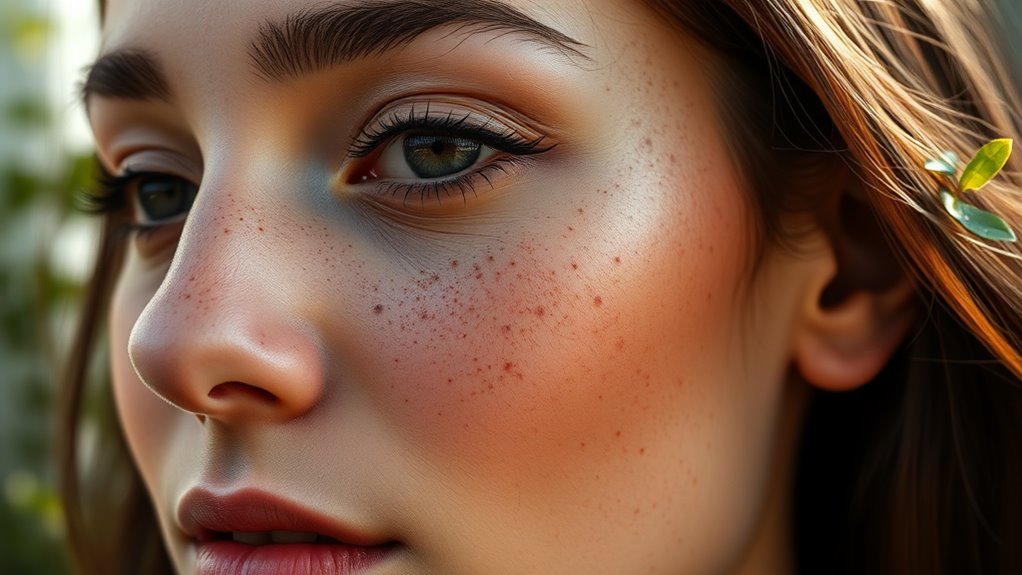7 Little-Known Causes of Dark Spots on Your Face
Dark spots on your face can stem from various unexpected sources that you might not consider. Hormonal fluctuations, certain medications, and even what you eat can play a significant role. Additionally, stress, environmental factors, and the products you use could be contributing to this skin issue. Understanding these lesser-known causes is crucial for effective management and prevention. Let’s explore these factors to better address the dark spots and their underlying triggers.
Hormonal Changes
Hormonal changes can significantly impact your skin’s appearance, leading to the development of dark spots. These unexpected dark spot causes are often linked to fluctuations in hormones, especially during puberty, menstruation, pregnancy, and menopause.
Increased melanin production arises from hormonal imbalances, resulting in localized pigmentation changes. Conditions like melasma may develop, characterized by brown patches on the face, primarily affecting women.
Factors such as stress and thyroid disorders may also trigger these hormonal shifts, further complicating your skin’s overall health. Additionally, addressing dark spots through targeted treatments can improve overall skin tone and texture.
To address these unexpected dark spot causes, consider consulting a dermatologist who can recommend appropriate treatments or lifestyle adjustments based on your specific hormonal status and skin condition.
Early intervention can help manage and prevent further dark spot formation.
Medication Side Effects
Certain medications can also play a significant role in the formation of dark spots on your face.
Drugs such as certain antibiotics, antihypertensives, and chemotherapy agents may trigger photosensitivity or hyperpigmentation. When exposed to sunlight, these medications can cause an overproduction of melanin, leading to those unwanted dark spots.
Additionally, some anti-seizure medications, like phenytoin, are known to cause skin discoloration. If you’ve recently started a new medication and noticed changes in your skin’s appearance, consult your healthcare provider.
It’s crucial to identify whether the medication is the culprit. Your doctor may suggest alternatives or adjustments to minimize side effects while still addressing your health needs without compromising your skin’s health.
Always prioritize communication about any skin concerns.
Dietary Factors
Your diet can play a pivotal role in the development of dark spots on your face. Consuming high amounts of sugar and refined carbohydrates can lead to increased insulin levels, promoting inflammation and hyperpigmentation.
Moreover, inadequate intake of antioxidants—such as vitamins C and E—may diminish your skin’s ability to combat oxidative stress, exacerbating dark spot formation. Additionally, excessive alcohol consumption can disrupt liver function, leading to skin discoloration.
Hydration is also crucial; dehydration can cause skin to become dull, making dark spots more pronounced. To mitigate these risks, focus on a balanced diet rich in fruits, vegetables, whole grains, and healthy fats. Foods that are known to trigger acne breakouts can also contribute to skin issues, including dark spots.
These choices support overall skin health and may help prevent the emergence of dark spots.
Environmental Pollutants
Environmental pollutants, including chemicals, heavy metals, and particulate matter, can significantly affect your skin’s health.
Exposure to these pollutants can lead to dark spots and other skin issues by causing oxidative stress and inflammation.
Understanding the sources of pollution and implementing protective measures can help minimize their impact on your complexion.
Sources of Environmental Pollution
How do the pollutants in your surroundings contribute to dark spots on your face? Various sources of environmental pollution can play a significant role. Airborne particulates from vehicle emissions, industrial discharges, and dust can settle on your skin, leading to irritation and uneven pigmentation.
Chemicals like volatile organic compounds (VOCs) from household products and aerosols expose your skin to harmful toxins which may disrupt its natural balance. Additionally, UV radiation emitted from smog and pollutants can damage skin cells and heighten melanin production, causing hyperpigmentation.
Water pollution, stemming from agricultural runoff and wastewater releases, can also introduce harmful substances to your skin through contact. Awareness of these pollutants can help you take necessary precautions to protect your skin’s health.
Impact on Skin Health
While pollutants persist in your surroundings, they can significantly compromise skin health. Exposure to environmental toxins, such as heavy metals and volatile organic compounds, leads to oxidative stress, which damages skin cells. This damage can trigger inflammation, contributing to conditions like hyperpigmentation and premature aging.
Fine particulate matter, often found in urban areas, can penetrate the skin barrier, disrupting its natural function and exacerbating existing skin issues. Additionally, ultraviolet radiation often combines with these pollutants, intensifying their harmful effects. You may notice dark spots emerging as a direct consequence.
Therefore, understanding how environmental pollutants interact with your skin is essential for recognizing the potential impacts on your overall skin health. Protecting your skin from these aggressors is crucial.
Prevention and Protection Tips
To effectively shield your skin from pollutants and reduce the risk of dark spots, consider implementing three essential prevention strategies.
-
Use sunscreen daily: Protect against UV rays that can exacerbate dark spots.
-
Cleanse thoroughly: Wash your face to remove dirt, makeup, and pollutants.
-
Incorporate antioxidants: Use skincare products with vitamins C and E to neutralize free radicals.
-
Stay hydrated: Drink plenty of water to maintain skin elasticity and flush out toxins.
-
Limit exposure: Avoid heavily polluted areas when possible and wear protective clothing.
Stress and Anxiety
Stress and anxiety can significantly impact your skin’s health, leading to the development of dark spots on your face.
When you experience stress, your body produces higher levels of cortisol, a hormone that can disrupt various bodily functions, including skin health. This hormonal imbalance can increase melanin production, causing hyperpigmentation.
Additionally, stress may prompt behaviors such as scratching or picking at the skin, further contributing to the formation of dark spots.
Anxiety can hinder your skin’s natural healing processes, making it more susceptible to damage. Further compounding the issue, stress contributes to various skin issues, which underscores the importance of addressing emotional well-being for overall skin health.
To mitigate these effects, it’s essential to adopt stress-reduction techniques, such as mindfulness or regular exercise, and to maintain a consistent skincare routine to support your skin’s resilience against the impacts of emotional stressors.
Sleep Deprivation
Sleep deprivation has a notable impact on skin health, often resulting in dark spots on the face. When you don’t get enough sleep, your body’s ability to repair itself diminishes, leading to uneven skin tone and pigmentation issues.
Here’s how sleep deprivation can affect your skin:
-
Reduced collagen production: Lack of sleep decreases collagen levels, weakening skin structure.
-
Increased cortisol levels: Elevated stress hormones can trigger pigmentation disorders.
-
Impaired skin barrier function: Sleep loss disrupts the skin’s ability to protect itself, leading to irritation.
-
Inflammation: Inadequate rest fuels inflammatory responses, worsening skin conditions.
-
Poor nutrient absorption: Sleep deprivation limits blood flow, affecting nutrient delivery to skin cells.
Addressing sleep needs is crucial for maintaining healthy, radiant skin, as insufficient rest can lead to skin health issues that may become more pronounced over time.
Skin Care Products
While your skin care routine may seem straightforward, the products you choose can significantly influence the appearance of dark spots on your face. Certain ingredients, especially those with strong chemicals, can irritate your skin, potentially leading to inflammation that triggers hyperpigmentation.
For example, some exfoliants, if overused, may cause skin sensitivity and darkening. Moreover, sunblock is essential; inadequate protection from UV rays can exacerbate existing spots and create new ones.
Additionally, check for photosensitizing ingredients, like certain retinoids, as they increase skin’s sensitivity to sunlight. Incorporating products with antioxidants like vitamin C can help brighten your complexion and counteract dark spots. Lastly, always patch-test new products to minimize adverse reactions.
Choose wisely to maintain an even skin tone.




